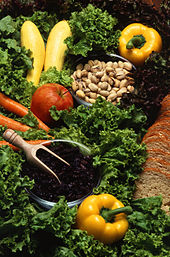
Back تغذية نباتية Arabic خوراک گیاهی Persian Diete vegetariane Italian Вегетариандык тамактануу Kirghiz Вегетарианское питание Russian 素食營養學 Chinese

Vegetarian nutrition is the set of health-related challenges and advantages of vegetarian diets.
Appropriately planned vegetarian diets are healthful and nutritionally adequate for all stages of the human life cycle, including during pregnancy, lactation, infancy, childhood, and adolescence.[1] However, vegetarian diets deficient in vitamin B12 or calories may compromise children's health and development.[1][2] The UK National Health Service recommends that vegetarian diets should also follow the general recommendations for healthy diets, such as low fat, salt and sugar intakes and 5 fruits or vegetables a day.[3] Qatar's public health ministry states, "One cannot be a healthy vegetarian by going to a fast food restaurant and ordering french fries and soda!".[4]
Vegetarian diets tend to be rich in carbohydrates, omega-6 fatty acids, dietary fibre, carotenoids, folic acid, vitamin C, vitamin E, potassium and magnesium. They are possibly low in saturated fat, cholesterol, and animal protein.
- ^ a b American Dietetic, Association; Dietitians Of, Canada (2003). "Position of the American Dietetic Association and Dietitians of Canada: Vegetarian diets". Journal of the American Dietetic Association. 103 (6): 748–65. doi:10.1053/jada.2003.50142. PMID 12778049.
- ^ Black, Maureen (June 2008). "Effects of vitamin B12 and folate deficiency on brain development in children". Food and Nutrition Bulletin. 29 (2 Suppl): S126–31. doi:10.1177/15648265080292S117. PMC 3137939. PMID 18709887.
- ^ "The vegetarian diet". nhs.uk. 27 April 2018. Retrieved 22 May 2021.
- ^ "Qatar Dietary Guidelines" (PDF). Qatar MOPH. 2015. p. 18.